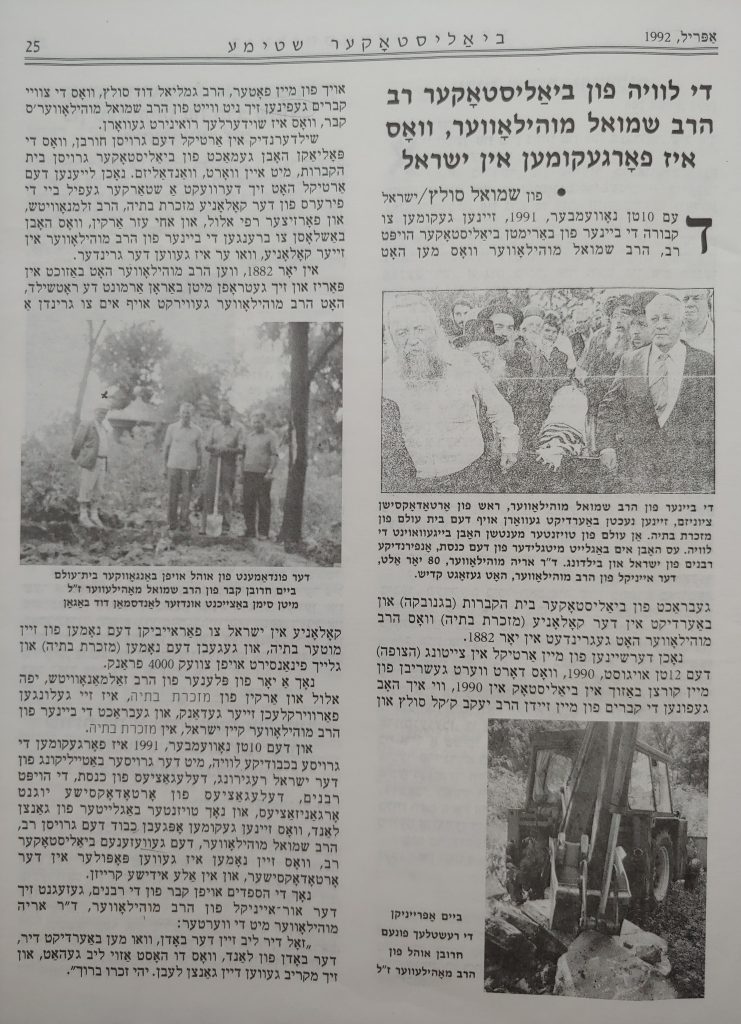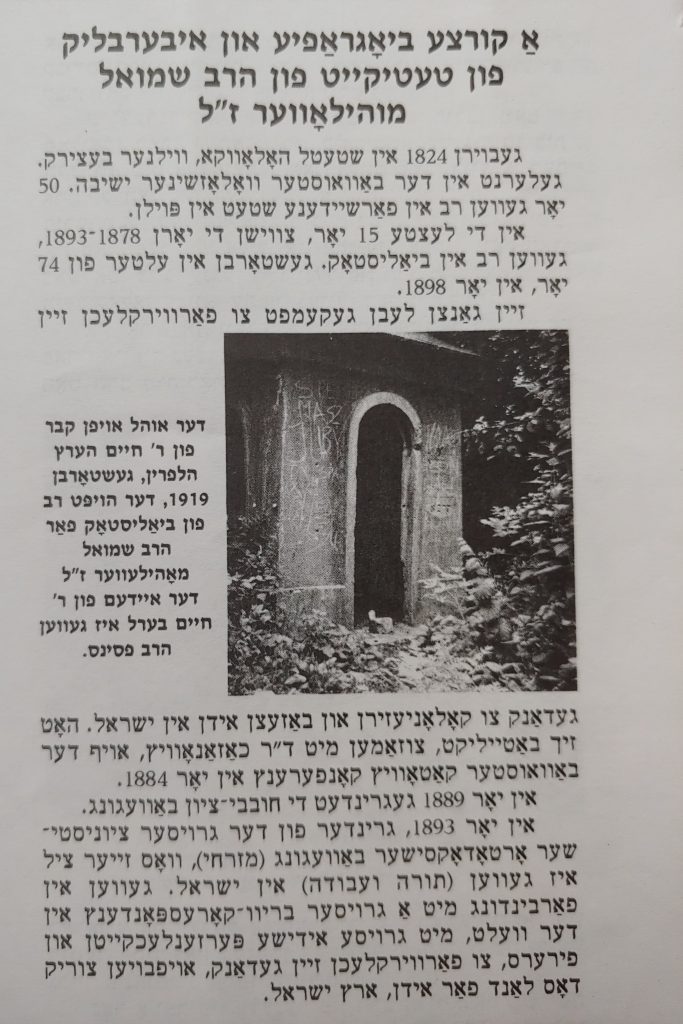The ‘Rediscovery’ of the Ohel of Rav Shmuel Mohilever on Bagnowka Cemetery, Bialystok, Poland.
Another re-discovery on Bagnowka Jewish Cemetery in Bialystok, Poland!
While reviewing my stash of Bialystoker Stimme magazines, I learned the identity of the rabbi once buried in the second ohel (mausoleum) on Bagnowka. It belongs to none other than the distinguished Rav Shmuel Mohilever! Readers may remember that the recent discovery of the WWII Luftwaffe Aerials confirmed that the foundations we had observed during cemetery restoration were those of this second ohel near the extant (though damaged) ohel of Chief Rabbi of Bialystok Chaim Hertz Halpern (d. 1921).
Mohilever served as Chief Rabbi of Bialystok from 1883 until his death in 1898. He was responsible for establishing Bagnowka Cemetery and in attendance at the dedication of Bagnowka in the winter of 1892. Mohilever is especially renowned for his gentle patience with all segments of society and his passion for Zionism.
For years I had been told that somewhere near the Halpern Ohel, Rav Mohilewer was buried. It is exciting to finally have this confirmation. But Mohilever is no longer buried on Bagnowka. In the pages of a 1992 Bialystoker Stimme magazine, I discovered an illustrated article that told of his exhumation, reburial and funeral in Mazkeret Batya in Israel in November of 1991. Given the dire state of Bagnowka and Mohilever’s ohel at that time, I can understand his followers desire to rebury him in Mazkeret Batya, a colony which he established in 1882. Today, perhaps a symbolic ohel with informational placard should be located on the foundations of his former burial site in remembrance of his Mohilever’s incredible contributions to Jewish Bialytok, Zionism and Bagnowka Cemetery itself.

Bialystoker Stimme, April 1992:25
The Funeral of Bialystoker Rav Shmuel Mohilever
by Shmuel Sultz, Israel
On the 10th of November 1991, the bones of the eminent Bialystoker Chief Rabbi, Rav Shmuel Mohilever were reburied. He was brought from the Bialystok Cemetery (Bagnowke), and honored in the colony (Mazkeret Batya), which Rav Mohilever established in the year 1882.
This was after the publication of my article in the newspaper (HaTsopah) on 12th August 1991, where I wrote about my short visit to Bialystok in 1990, as well as looking for the graves of my grandfather, Rav Jakob (k”kl) Sultz, and also my father, Rav Gamaliel David Sultz, both graves were not found a distance from Rav Shmuel Mohilever’s grave, which was in a horrible state.
Pictured in the article in great ruins, was the vandalization that was done by the Poles against Bialystok’s largest cemetery, with no reason. Further in the article, one can read a strong appeal by the leaders of the colony of Mazkeret Batya, Rav Zalmanowicz, and Chairman Raphael Elul, and my brother Ezer Arkin, who were determined to bring the bones of Rav Mohilever to their colony, which he founded.
In the year 1882, when Rav Mohilever had visited Paris and met with Baron Armand de Rothschild, Rav Mohilever worked with him to establish a colony in Israel to perpetuate the name of his mother, Batya, and given the name (Mazkeret Batya) and he financed the equivalent of 4000 franks for its purchase.
In the year of the plenary of Rav Zalmanowicz, Yafeh Elul and Arkin from Mazkeret Batya, and an entourage, had an idea to bring the bones of Rav Mohilever to Israel, to Mazkeret Batya.
On the 10th of 1991, a large dignified funeral took place with a large participation by the Israeli government, a delegation from the Knesset, the chief rabbi, an Orthodox youth delegation, and also a thousand trustworthy people from the entire land, who came devoted to honor this great rabbi, Rav Shmuel Mohilever, the visionary Bialystoker Rav, whose name was made popular in the Orthodox community and in all Jewish circles.
Amidst the graveside eulogies by rabbis, the descendant of Rav Mohilever, Rabbi Arie Mohilever said goodbye with the following words: “The heart should be in the ground where people honor it, the ground of (this) land which you loved and (to which you) were a friend to (sacrificed yourself) for your entire life. May his name be blessing.”
A brief biography also follows in the Bialystoker Stimme:

See also Bagnowka: A Modern Jewish Cemetery on the Russian Pale (pp. 7-9) for my brief biography of Rabbi Shmuel Mohilewer and his contribution to Bagnowka Cemetery.